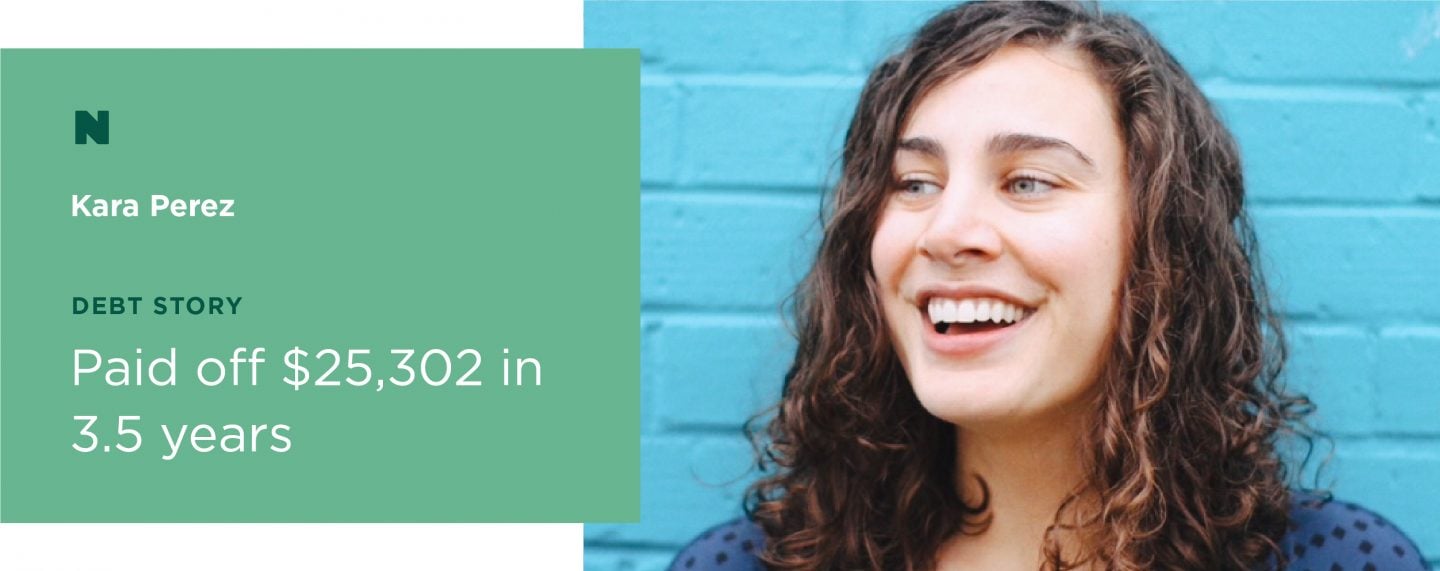In this series, NerdWallet interviews people who have triumphed over debt using a combination of commitment, budgeting and smart financial choices. Responses have been edited for length and clarity.
Kara Perez
How much: $25,302 in 3.5 years
Kara Perez has never had a full-time job. The 30-year-old entrepreneur from Austin, Texas, juggled multiple part-time jobs in her 20s, from catering to nannying to teaching high school lacrosse.
Perez graduated in 2011 with an English degree and more than $25,000 in student loan debt. Three years into “adulting” with no job offer in sight, she knew she could not afford to live with debt forever. “I realized: No one is going to save me. I have to save myself from this life I’m living,” she says.
Perez decided to make the most of her gig economy lifestyle and kicked things into high gear — balancing five jobs and working seven days a week. She put every extra dollar she made toward debt.
Now debt-free, Perez runs her own business, called Bravely, a financial education and event company that teaches women how to manage money. She shared her highs and lows with NerdWallet, and her story may inspire you to pay off your debt.
What was your debt and salary when you started?
I graduated in 2011 with a little over $25,000 spread across five different loans. When I got really super serious [about paying off debt] in 2014, I had about $18,000 left and I earned $18,423.
How did you end up in debt?
I went to my first-choice school [Wesleyan University]. I come from a single-income household, and taking out loans was always part of the plan.
What triggered your decision to get out of debt?
Frankly, watching everyone around me move forward with their lives and feeling like I was drowning. I was spending my time mostly crying and freaking out. I was applying to jobs but I hadn’t gotten hired. I was three years out of college and working as a part-time caterer and 10 hours a week as a receptionist at a gym.
My friends were traveling, getting real jobs or promotions, and I was stuck.
[When I was learning about money] I had to put one student loan in deferment for six months because I couldn’t afford the payments.
What steps did you take?
I did two things: I cut everything even remotely feasible in my budget, and I started looking for more work. I drove a van for a high school golf team. I did freelance writing for $12 an hour on small blogs and freelance social media management.
I also got crazy frugal. I would bring home leftovers from my catering job and eat those instead of spending money on groceries some weeks.
[Perez lived with multiple roommates at the time]. My roommates were my best friends, but they all came from very wealthy backgrounds with no debt. People were very supportive; my friends would come home for dinner instead of [making me] eat out.
I’m still frugal — I live with my boyfriend and a roommate and don’t go out to eat so much.
That must have been a hard juggling act.
I had five different part-time jobs, and often worked seven days a week. I was really burnt out by the end of it, but I was also proud as hell.
Tell me about using the debt avalanche method to pay your loans.
I had one federal loan at 6.8%; that was my highest interest rate. [Debt avalanche focuses on the debt with the highest interest.] I put any extra payments toward that and made the minimum payments on everything else.
Did your income change over the years?
Catering and the social media work I did was hourly, so I asked for more hours. I also negotiated for raises at my catering and nonprofit jobs, so that helped. I went from $12 an hour as a caterer to $15.50 over the course of a year. In 2015 [the year she paid off debt], I earned $32,249.63.
Is there anything you would have done differently?
Looking back, the biggest thing I wish I had done was start investing in my retirement accounts in tandem with paying off debt. I didn’t start investing until afterwards and that was time my money could have been growing in the bull market.
What are your goals now?
How to ditch your own debt
- Build a budget so that you can put money toward debt, but also save for emergencies and tuck some away for fun. For this purpose, we like the 50/30/20 budget, in which your spending is divided among needs, wants, and savings and debt repayment.
- The debt avalanche method that Perez used is a more effective way to pay off debt because you can save on interest, but for quick wins, you can also try the debt snowball and pay off your smallest debt amount first.
- As Perez notes, saving for retirement is something that can and should be done alongside debt payoff.
The article How I Ditched Debt: Making the Most of a Gig Economy originally appeared on NerdWallet.



